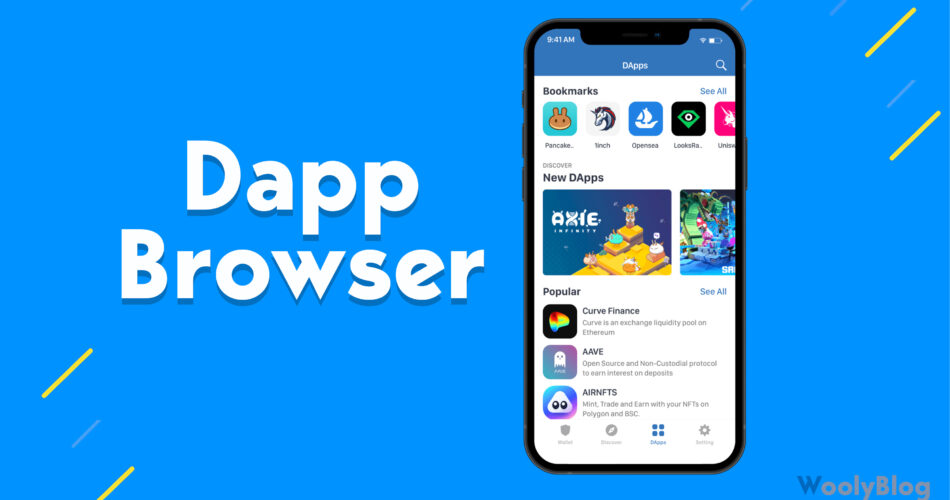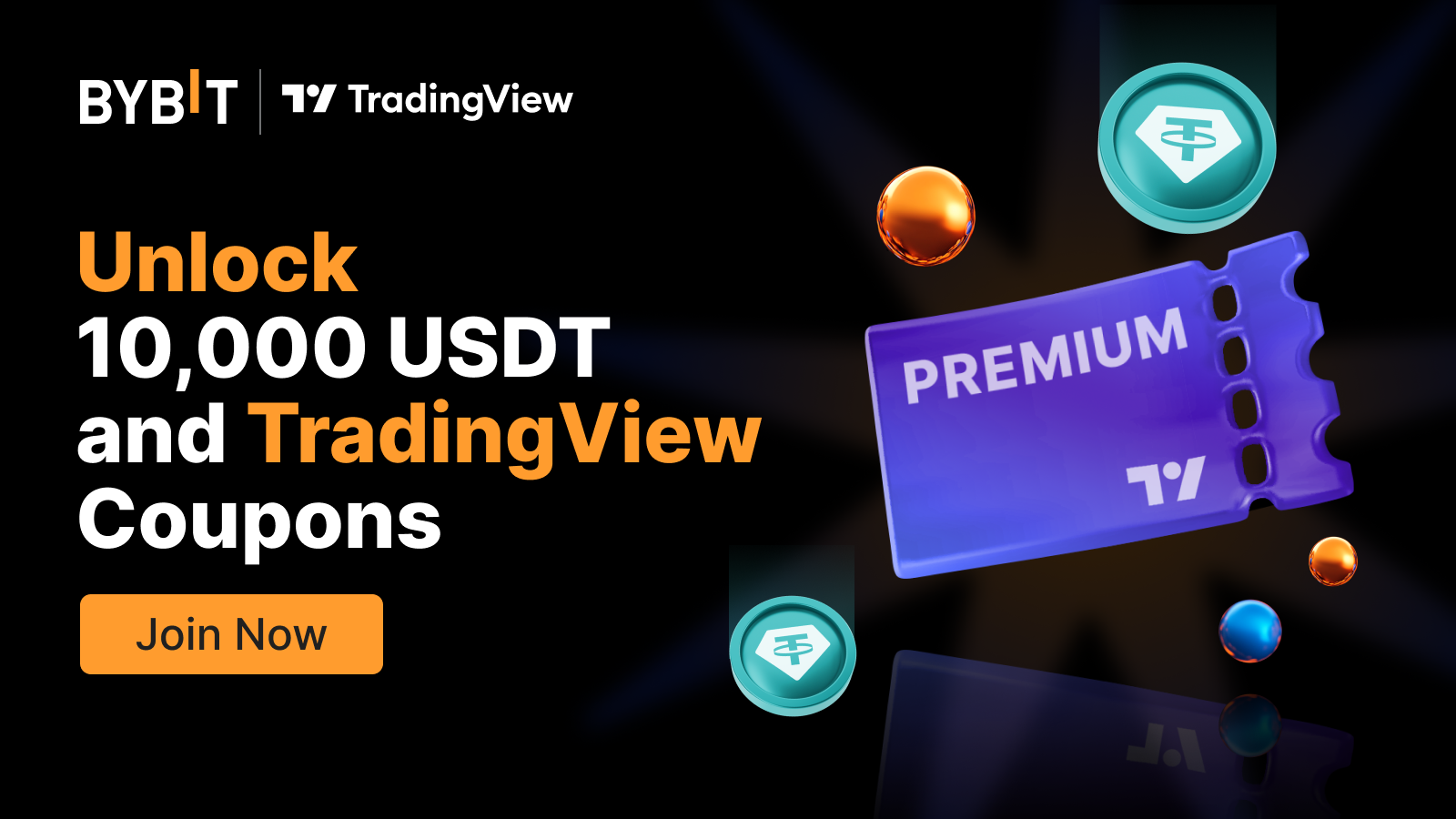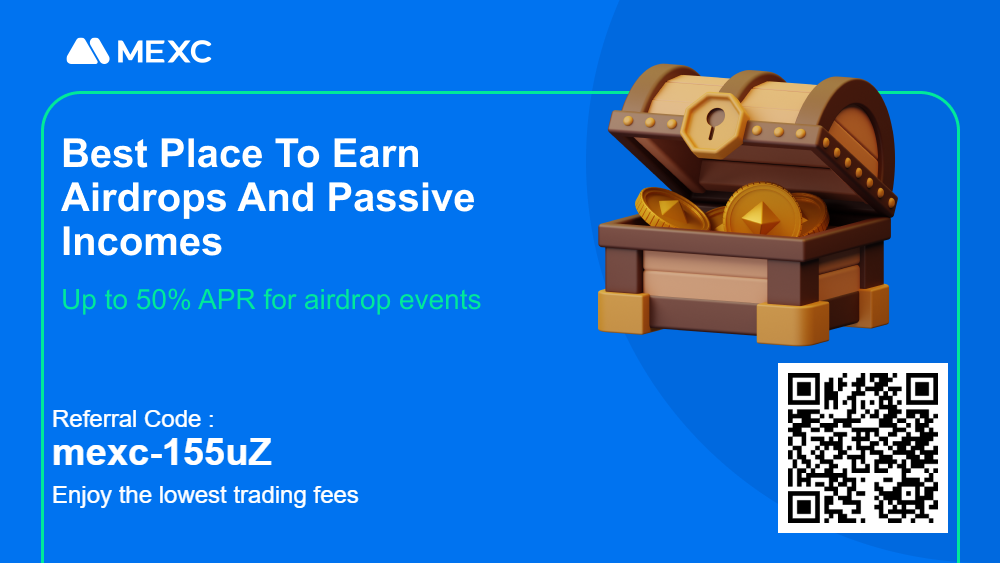In the ever-evolving digital landscape, dapp browsers stand out as a beacon of innovation. With WoolyPooly’s authoritative stance in the niche, having meticulously reviewed all prominent Dapp browsers, we present an in-depth exploration of these digital gateways. Let’s embark on this journey to understand the decentralized web’s next big thing.
Table of Contents
What is a Dapp Browser?
A Dapp browser, short for “decentralized application browser,” is a specialized web browser designed to interact with blockchain-based applications, known as dapps. Unlike traditional browsers, which primarily access websites hosted on centralized servers, Dapp browsers connect users directly to decentralized platforms on the blockchain. This allows for seamless interactions with smart contracts, secure transactions, and a more transparent web experience. In essence, Dapp browsers serve as a gateway to the decentralized internet, enabling users to harness the full potential of blockchain technology.
The Meteoric Rise of Decentralized Applications
Decentralized Applications, commonly known as dapps, represent a paradigm shift in the way we think about software and online interactions. Unlike traditional applications that run on centralized servers, dapps operate on blockchain technology, ensuring transparency, security, and decentralization.
Origins and Evolution
The concept of dapps isn’t entirely new. However, the rise of Ethereum, a blockchain platform with a focus on smart contracts, provided the necessary infrastructure for dapps to flourish. Ethereum’s promise of a “world computer” paved the way for developers to create applications that are not controlled by any single entity but are instead governed by community consensus.
Benefits of Using a Dapp Browser
Why are dapp browsers gaining traction? Here’s why:
| Benefit | Description | Use Cases |
|---|---|---|
| Seamless Interaction | Dapp browsers are tailored for the decentralized web, ensuring smooth interactions with dapps. | – Accessing decentralized marketplaces – Engaging with decentralized social media platforms |
| Enhanced Privacy | Dapp browsers prioritize user data protection, ensuring personal information isn’t shared without consent. | – Securely browsing decentralized platforms – Private messaging on decentralized networks |
| Direct Decentralized Web Access | Dapp browsers act as a direct portal to the decentralized internet, bypassing intermediaries. | – Streaming content from decentralized platforms – Participating in decentralized voting systems |
| Censorship Resistance | Dapp browsers offer access to a web where content isn’t easily censored by governments or corporations. | – Accessing geo-restricted content – Publishing content without fear of takedowns |
| Integrated Wallet Functionality | Most dapp browsers come with built-in cryptocurrency wallets for transactions and asset management. | – Purchasing items on decentralized marketplaces – Storing and managing various cryptocurrencies |
| Interactivity with Smart Contracts | Dapp browsers facilitate direct interactions with smart contracts on the blockchain. | – Participating in token sales (ICOs) – Engaging in decentralized finance (DeFi) activities |
| Enhanced Security | Dapp browsers offer advanced security features, such as encrypted private keys and phishing protection. | – Securely accessing financial dapps – Safeguarding digital assets while browsing |
Key Features of Dapp Browsers
Dapp browsers are more than just gateways to the decentralized web; they are equipped with a suite of features tailored to enhance the user experience and facilitate seamless interactions with blockchain-based platforms. Let’s delve into the standout features that set dapp browsers apart from conventional web browsers:
1. Integrated Wallet Functionality
Dapp browsers often come with built-in cryptocurrency wallets. This integration is pivotal for users to interact with dapps, especially when transactions or smart contract interactions are involved. Users can send, receive, and manage their digital assets without needing to switch between multiple applications.
Use Case
Participating in a decentralized auction or purchasing digital art would require users to make payments. The integrated wallet allows for instant transactions right from the browser.
2. Direct Interaction with Smart Contracts
One of the cornerstones of dapps is smart contracts – self-executing contracts with the terms directly written into code. Dapp browsers allow users to interact directly with these contracts, be it for executing a function or reading data.
Use Case
A user wants to join a decentralized autonomous organization (DAO). Through the dapp browser, they can directly interact with the DAO’s smart contract to become a member.
3. Enhanced Security Protocols
Given the financial implications often associated with dapps, security is paramount. Dapp browsers come equipped with advanced security features, including encrypted private keys, phishing protection, and secure identity verification.
Use Case
When accessing a DeFi platform to lend or borrow funds, users can be assured that their transactions and personal data are safeguarded against potential threats.
4. Support for Decentralized Protocols
Dapp browsers are designed to natively support various decentralized protocols and standards, ensuring compatibility and smooth performance across a wide range of dapps.
Use Case
A user wants to access a decentralized file storage platform. The dapp browser’s support for the platform’s specific protocol ensures a seamless experience.
5. Privacy-centric Browsing
In a world where data privacy concerns are escalating, dapp browsers prioritize user privacy. They offer features like preventing trackers, ensuring that users’ online activities aren’t constantly monitored by third parties.
Use Case
Browsing a decentralized social media platform without being bombarded with targeted ads, thanks to the browser’s privacy features.
6. Cross-Chain Support
As the blockchain ecosystem grows, there’s an increasing need for interoperability. Many dapp browsers now offer support for multiple blockchains, allowing users to switch between different networks effortlessly.
Use Case
A user wants to interact with dapps on both the Ethereum and Binance Smart Chain networks. The dapp browser facilitates this without the need for multiple tools.
Popular Dapp Browsers in the Market
The market is brimming with options. Here are some standouts:
| Browser Name | Key Features | Supported Networks | Supported Platforms |
|---|---|---|---|
| MyEtherWallet (MEW) | – Open-source – Client-side interface – Generate Ethereum wallets | Ethereum | Web, Mobile (iOS & Android) |
| OKX Wallet | – Unified experience – Manage digital assets – Access Web3 ecosystem | Multiple Networks | Mobile (iOS & Android) |
| 1inch Wallet | – Non-custodial – Built-in DEX aggregator | Multiple Networks | Web, Mobile (iOS & Android) |
| Opera | – Free internet browser – Integrated VPN – Social network integrations | Ethereum, Tron, Bitcoin, BNB | Web, Desktop (Windows, macOS, Linux), Mobile (iOS & Android) |
| Bitget Wallet | – Web3 multichain wallet – Comprehensive platform – DApp Browser and Launchpad | Multiple Networks | Web (Browser Extension), Mobile (iOS & Android) |
| MetaMask | – Browser extension & mobile app – Key vault, secure login – Token wallet & exchange | Ethereum, Binance Smart Chain, and more | Web (Browser Extension), Mobile (iOS & Android) |
| Coinbase Wallet | – Secure app for storing crypto – Decentralized apps – Pay friends feature | Ethereum, Ethereum Classic, and more | Mobile (iOS & Android) |
| Trust Wallet | – Secure mobile wallet – Supports Ethereum & ERC20/ERC223 tokens | Multiple Networks | Mobile (iOS & Android), Web (Browser Extension) |
Choosing the Right Dapp Browser
With so many options, how do you pick? Consider compatibility, supported dapps, user interface, and security features. Which one aligns with your needs?
1. MyEtherWallet (MEW)
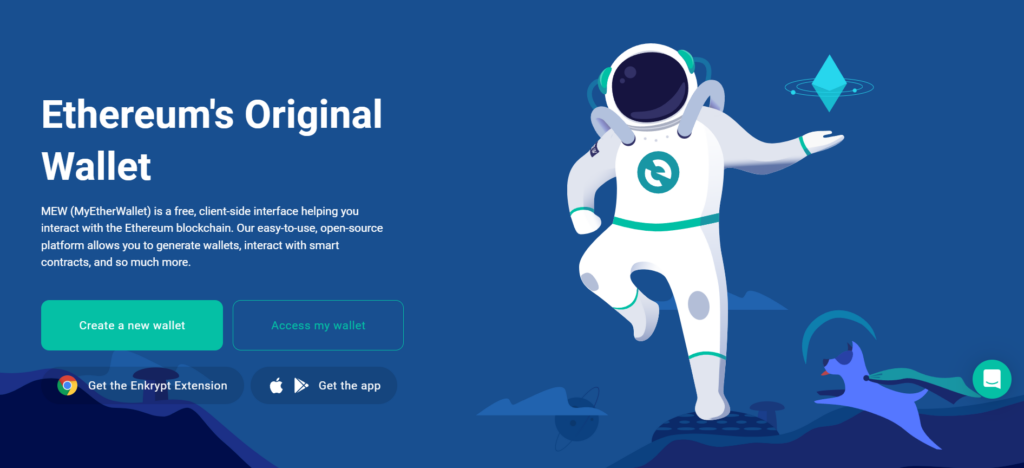
MyEtherWallet, often abbreviated as MEW, is an open-source, client-side interface designed to generate Ethereum wallets and facilitate interactions with the Ethereum blockchain.
Pros & Cons:
| Pros | Cons |
|---|---|
| Open-source, ensuring transparency | Limited primarily to Ethereum |
| User-friendly interface | Web interface might be challenging for beginners |
| Supports hardware wallets for added security | Requires caution against phishing sites |
2. OKX Wallet
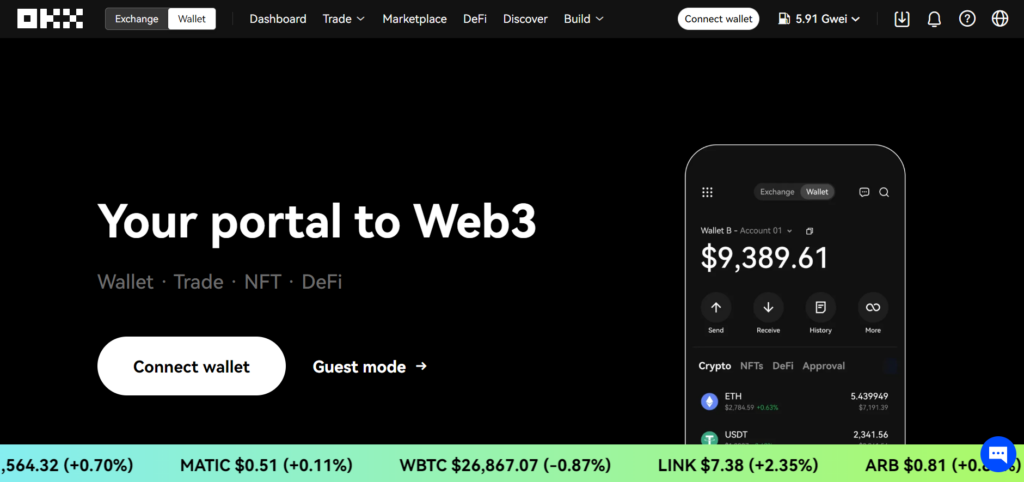
OKX Wallet offers a unified experience for managing digital assets and accessing the Web3 ecosystem. It’s designed to be a comprehensive platform for all things crypto.
Pros & Cons:
| Pros | Cons |
|---|---|
| Comprehensive crypto management tools | Mobile-centric; might not be ideal for desktop users |
| Supports a wide range of tokens and coins | Interface might be overwhelming for new users |
| Regular updates and added features | Limited community support compared to older wallets |
3. 1inch Wallet
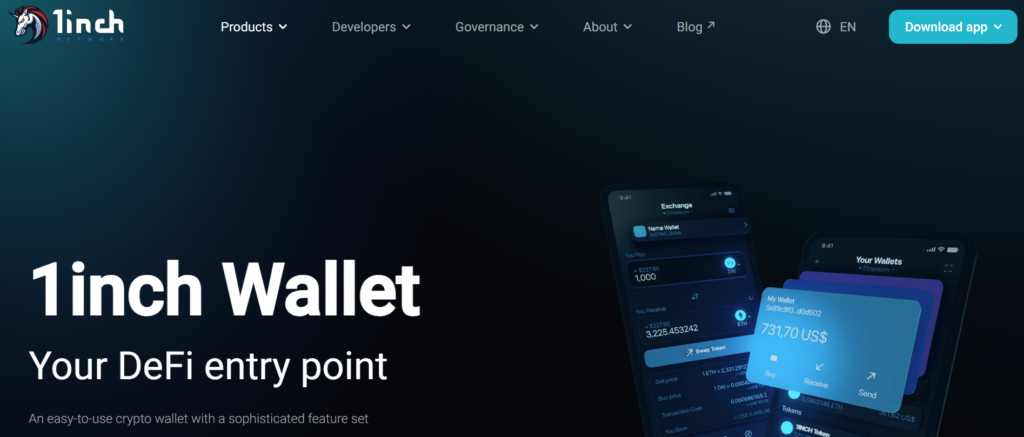
1inch Wallet is a non-custodial crypto wallet with a built-in DEX aggregator. It’s designed for efficient crypto management across multiple networks.
Pros & Cons:
| Pros | Cons |
|---|---|
| Integrated DEX aggregator for best trade rates | Primarily focused on trading |
| Supports multiple networks | Might be complex for users new to DeFi |
| Regular updates and new features | Requires understanding of gas fees and network congestion |
4. Opera
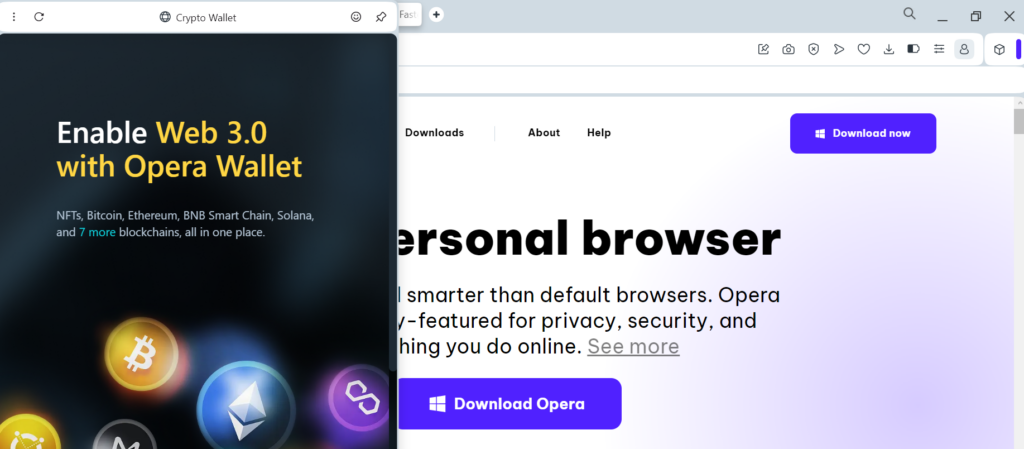
Opera is a renowned web browser known for its speed and privacy features. Its recent versions come with integrated crypto wallets and native Web3 support. You have to just enable it in settings:

Pros & Cons:
| Pros | Cons |
|---|---|
| Established and trusted brand | Not exclusively a DApp browser |
| Integrated VPN for added privacy | Limited blockchain networks supported |
| Built-in ad-blocker | Might be resource-intensive on some devices |
5. Bitget Wallet
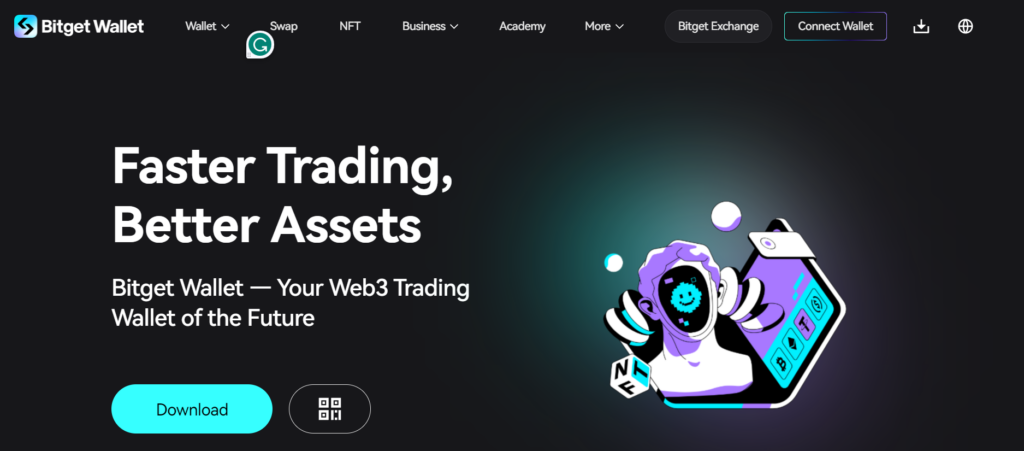
Bitget Wallet is a Web3 multichain wallet that offers a comprehensive platform, including a DApp Browser and Launchpad. It’s tailored for the modern crypto enthusiast.
Pros & Cons:
| Pros | Cons |
|---|---|
| Supports over 90 public chains | Newer in the market; less community trust |
| Significant presence in the NFT market | Interface might be complex for beginners |
| Integrated DApp browser | Limited user reviews and feedback |
6. MetaMask
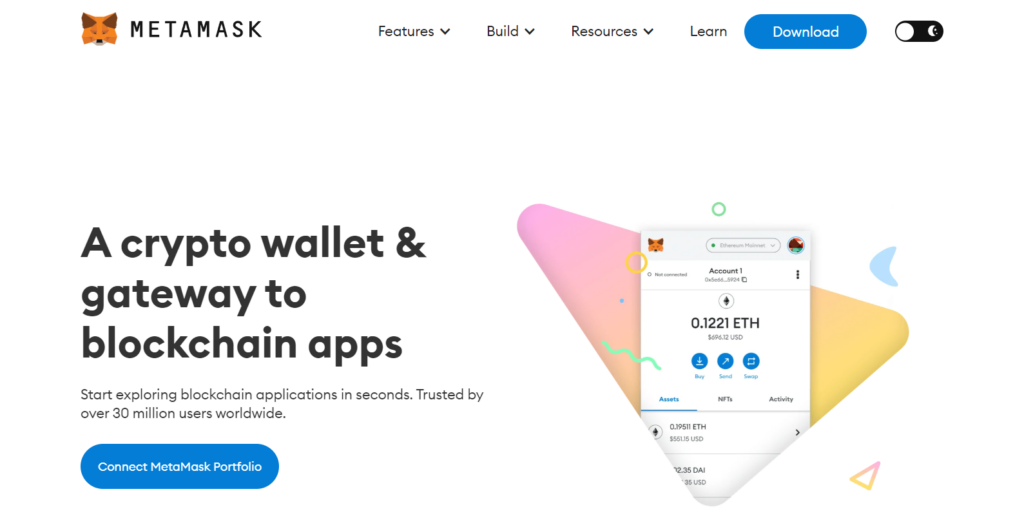
MetaMask is a widely-used crypto wallet that comes with an integrated DApp browser. It functions as a bridge between conventional browsers and the Ethereum blockchain, allowing users to run Ethereum dApps right in their browser without running a full Ethereum node.
Pros & Cons:
| Pros | Cons |
|---|---|
| Easy-to-use browser extension | Primarily Ethereum-focused |
| Mobile app available for on-the-go access | Some users report high gas fee estimations |
| Large and active community support | Phishing scams have targeted users |
7. Coinbase Wallet
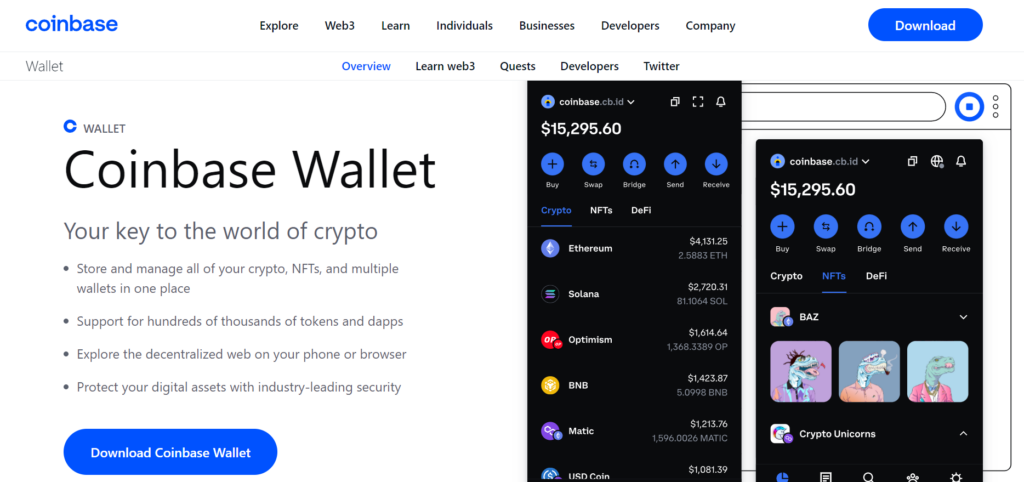
Coinbase Wallet is a secure app designed for storing crypto. Beyond just a wallet, it offers a platform for decentralized apps and provides features for sending and receiving cryptocurrency transactions.
Pros & Cons:
| Pros | Cons |
|---|---|
| Backed by a reputable brand (Coinbase) | Not as decentralized as some other options |
| User-friendly interface suitable for beginners | Limited to the assets supported by Coinbase |
| Integrated DApp browser | Some concerns about data privacy |
8. Trust Wallet
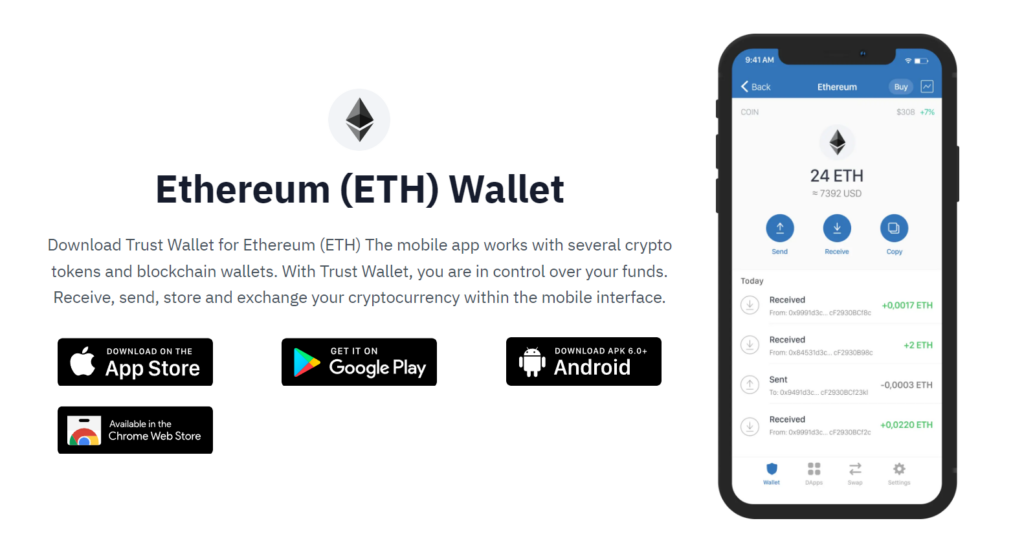
Trust Wallet is a crypto wallet known for its security and simplicity. It supports Ethereum and various ERC20/ERC223 tokens, making it a versatile choice for those invested in the Ethereum ecosystem.
Pros & Cons:
| Pros | Cons |
|---|---|
| Supports a wide range of tokens | Mobile-only might not be ideal for all users |
| Built-in DApp browser for easy access | Limited features compared to desktop wallets |
| Regular updates and new features | Requires careful management of private keys |
Setting Up and Using a Dapp Browser
Here’s a step-by-step guide on setting up and using a DApp browser:
1. Choosing the Right DApp Browser
Before diving into the setup process, it’s essential to select a DApp browser that aligns with your needs. As discussed earlier, there are several options available, each with its unique features and supported networks. Consider factors like user interface, supported platforms, and community reviews.
2. Download and Installation
For Mobile Users:
- Visit the App Store (for iOS users) or Google Play Store (for Android users).
- Search for your chosen DApp browser.
- Download and install the app
For Desktop Users:
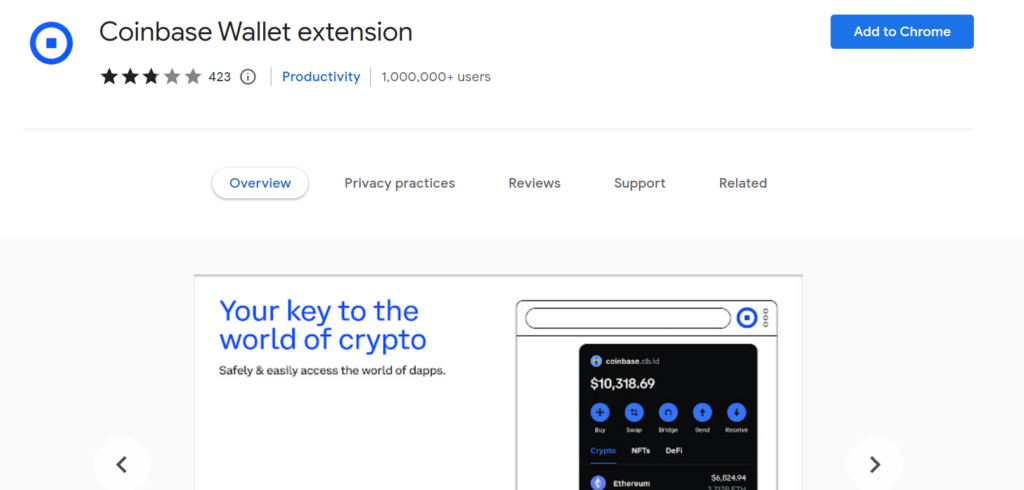
- Visit the official website of the DApp browser.
- Download the appropriate version for your operating system.
- Follow the installation prompts.
3. Setting Up Your Wallet
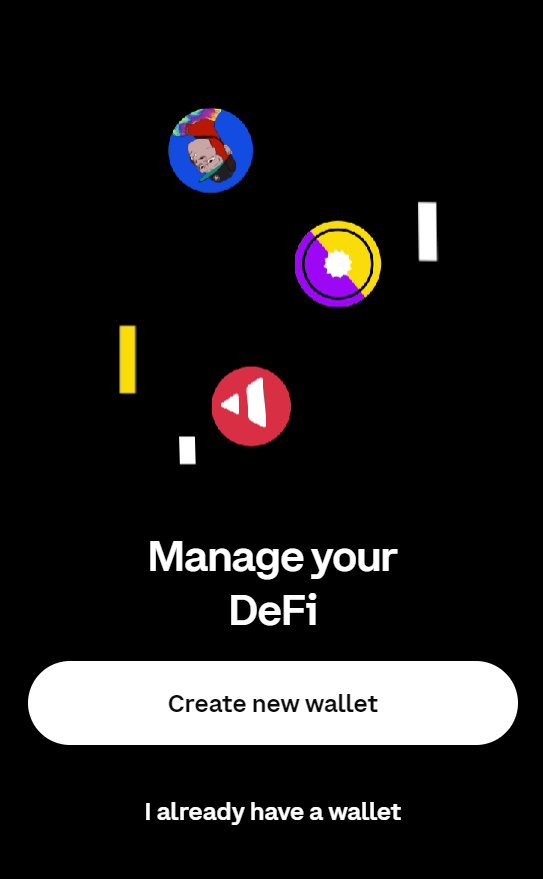
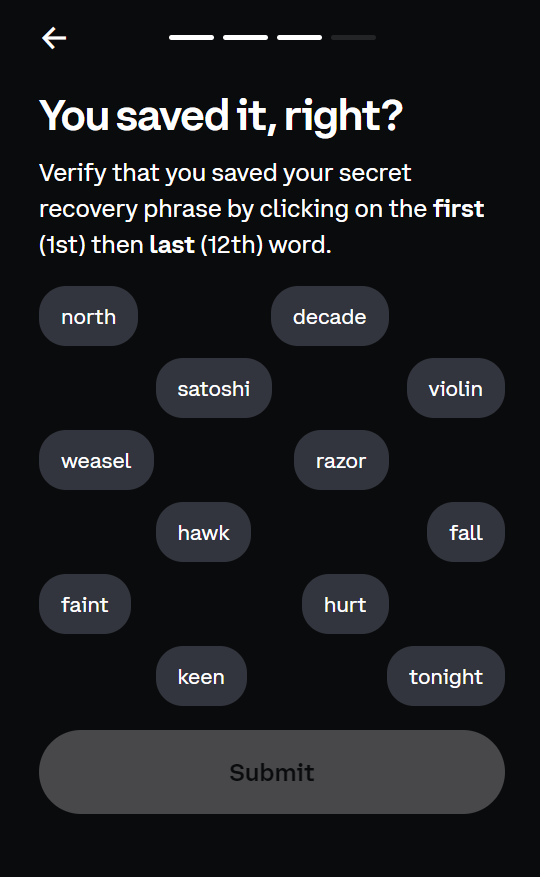
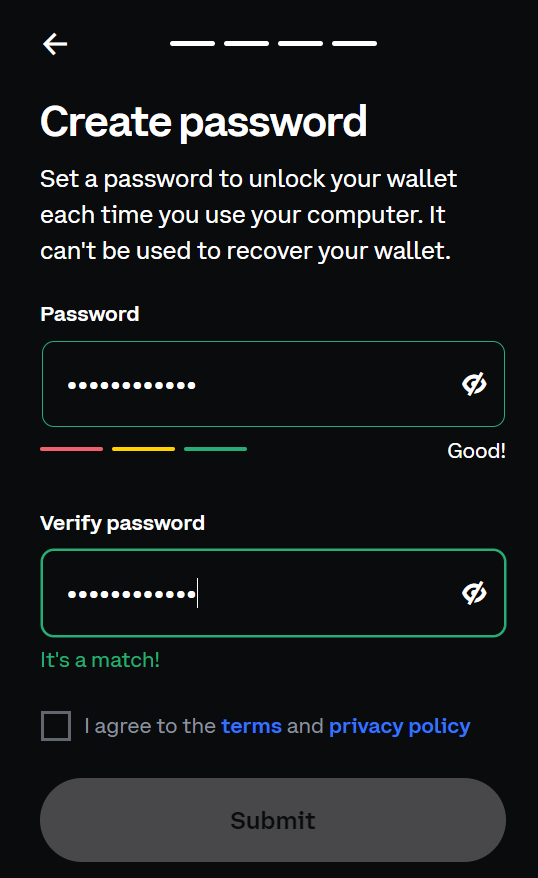
Most DApp browsers come with integrated wallets. Upon launching the browser for the first time:
- Choose to create a new wallet or import an existing one.
- If creating a new wallet, you’ll be provided with a seed phrase or private key. Ensure you store this securely as it’s crucial for recovering your wallet.
- Set a strong password for added security.
4. Navigating the DApp Browser
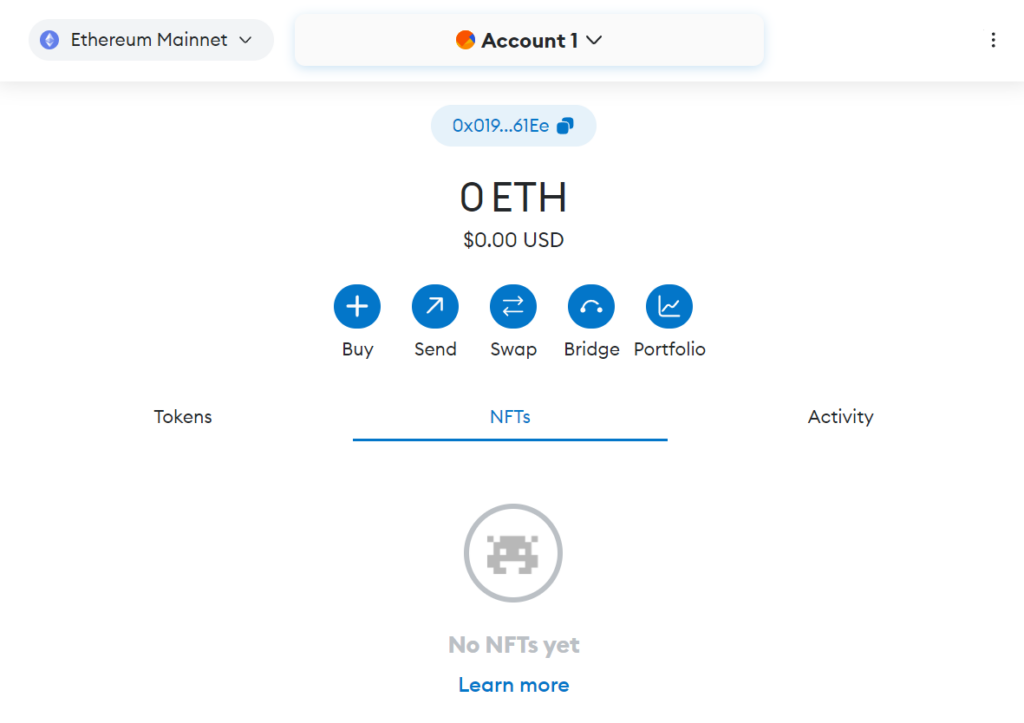
- Search Bar: Just like traditional browsers, enter the URL of the DApp you wish to access.
- Wallet Integration: Access your wallet, view your balances, and manage transactions directly from the browser interface.
- DApp Directory: Some browsers offer a curated list of popular DApps for easy access.
5. Interacting with DApps
- Visit the DApp’s URL or select it from the browser’s directory.
- Some DApps might require you to connect your wallet. Grant permission when prompted.
- Engage with the DApp, whether it’s participating in a DeFi protocol, minting an NFT, or any other activity.
6. Ensuring Security
- Always double-check URLs to avoid phishing sites.
- Regularly update your DApp browser to benefit from the latest security patches.
- Consider using hardware wallets for added security, especially for significant amounts.
7. Exploring Advanced Features
Many DApp browsers offer advanced features like:
- Cross-Chain Support: Switch between different blockchain networks effortlessly.
- Browser Extensions: Enhance functionality with additional tools and integrations.
- Custom RPCs: Connect to custom blockchain networks or private testnets.
Safety First: Dapp Browser Security
DApp browsers, being the primary interface between users and the decentralized web, must prioritize safety to ensure users’ assets and data remain uncompromised. Here’s a deep dive into the security aspects of DApp browsers:
1. Phishing Scams
Phishing remains one of the most common threats in the digital realm. Malicious actors create fake versions of popular DApps or wallets to deceive users into providing sensitive information.
| Preventive Measures | Description |
|---|---|
| URL Verification | Always double-check the URL before entering any sensitive information. Avoid clicking on suspicious links from emails or social media. |
| SSL Certificates | Ensure the DApp browser website uses HTTPS and has a valid SSL certificate. |
2. Private Key Management
The private key is a user’s most crucial piece of information, granting access to their digital assets.
| Preventive Measures | Description |
|---|---|
| Cold Storage | Consider using hardware wallets or cold storage for significant amounts, keeping private keys offline. |
| Avoid Sharing | Never share your private key. Legitimate platforms will never ask for it. |
3. Smart Contract Vulnerabilities
Smart contracts, while revolutionary, can have vulnerabilities. If a DApp browser interacts with a flawed contract, users might lose assets.
| Preventive Measures | Description |
|---|---|
| Audit Reports | Only interact with DApps that have undergone thorough security audits. |
| Community Feedback | Check community forums and reviews for any reported issues with the DApp. |
4. Browser Extensions
While extensions enhance functionality, they can also pose risks if they come from unverified sources.
| Preventive Measures | Description |
|---|---|
| Verified Sources | Only install extensions from trusted and verified sources. |
| Regular Updates | Ensure extensions are regularly updated to benefit from the latest security patches. |
5. Network Attacks
Attackers might try to compromise the network, leading to false data or lost transactions.
| Preventive Measures | Description |
|---|---|
| Multiple Confirmations | Wait for multiple confirmations for significant transactions. |
| Use Reputable Nodes | Connect to well-known and reputable blockchain nodes. |
The Road Ahead: Dapp Browsers’ Future
The next five years look promising. With deeper integration into decentralized technologies and overcoming existing challenges, dapp browsers are set to redefine our digital experiences.
1. Integration with Mainstream Browsers
While specialized DApp browsers have been the norm, there’s a growing trend of mainstream browsers integrating DApp functionalities. Browsers like Opera and Brave have already taken steps in this direction. As blockchain technology becomes more prevalent, we can expect more mainstream browsers to offer built-in DApp support.
2. Enhanced User Experience
The early days of the internet were marked by clunky interfaces and limited functionalities. Similarly, the current DApp ecosystem, being relatively young, has room for improvement in terms of user experience. Future DApp browsers will likely focus on intuitive designs, seamless interactions, and faster load times, making the decentralized web as user-friendly as its centralized counterpart.
3. Cross-Chain Functionality
With the proliferation of various blockchain networks, there’s a growing need for interoperability. Future DApp browsers might offer native cross-chain support, allowing users to interact with DApps across different blockchains seamlessly.
4. Advanced Security Measures
As the stakes get higher, so do the potential risks. DApp browsers of the future will likely incorporate advanced security measures, from biometric authentications to AI-driven threat detection, ensuring users’ assets and data remain protected.
5. Integration with IoT and Beyond
The Internet of Things (IoT) represents a network of interconnected devices, from smart fridges to wearable tech. As these devices become more integrated into our daily lives, there’s potential for DApp browsers to act as interfaces, allowing decentralized apps to interact with the physical world in novel ways.
6. Decentralized Identity and Privacy
One of the cornerstones of the decentralized web is the concept of self-sovereign identity, where users have complete control over their personal data. DApp browsers will play a crucial role in this, offering integrated solutions for decentralized identity management, ensuring users’ privacy and data sovereignty.
7. Enhanced Monetization Models
The traditional web relies heavily on advertising for monetization, often at the expense of user privacy. DApp browsers could pave the way for alternative monetization models, from token-based incentives to microtransactions, fostering a more equitable web ecosystem.
Conclusion
The digital landscape is undergoing a transformative shift, with decentralization at its core. DApp browsers, as the gateways to this new decentralized web, are not just tools but catalysts in this transformation. They represent a bridge between the traditional internet and the promise of a more open, transparent, and user-centric web.
As we’ve explored, the significance of DApp browsers extends beyond mere access to decentralized applications. They embody the principles of Web 3.0, from enhanced security and privacy to user empowerment and beyond. Their evolution, from their inception to their current state and the promising future ahead, mirrors the journey of the decentralized movement itself.
But as with any technology, the onus is on both developers and users. Developers must prioritize user experience, security, and continuous innovation. Users, on the other hand, must be informed, vigilant, and proactive in their approach to navigating the decentralized web.
In the grand tapestry of the digital revolution, DApp browsers are but one piece, albeit a crucial one. Their growth, challenges, and potential are a testament to the broader aspirations of the decentralized community. As we stand on the cusp of a new era in digital interaction, it’s clear that DApp browsers will play a pivotal role in shaping the future, driving us closer to a vision of a more inclusive, democratic, and transparent digital world.
FAQs
What is DApp browser in Trust Wallet?
The DApp browser in Trust Wallet is an integrated feature that allows users to interact directly with decentralized applications (DApps) from within the Trust Wallet app.
What is special about DApp browser?
A DApp browser is tailored for the decentralized web, enabling users to interact with DApps directly without intermediaries. It often integrates with crypto wallets, allowing seamless transactions and smart contract interactions on blockchain networks.
Why do I need a DApp browser?
A DApp browser provides a gateway to the world of decentralized applications, allowing users to access, interact with, and transact on the blockchain ecosystem. It’s essential for those looking to engage with DeFi platforms, NFT marketplaces, and other blockchain-based services.
